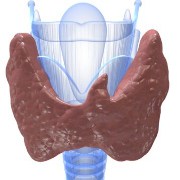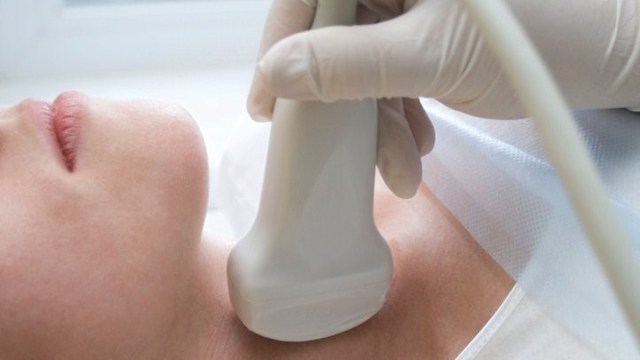 Photo: Getty Images
Photo: Getty Images
1) Hyperthyroidism is a treatable condition in which the thyroid gland produces too much of the hormones called thyroxine (T4) and triiodothyronine (T3). An overactive thyroid tends to run in families, is more common in women than men, usually occurs between the ages of 20 to 40 and often develops after periods of extreme stress or pregnancy.
2) The thyroid gland is a small, two-lobed gland located in the front of the neck, below the larynx. One lobe is located on each side of the trachea and is connected by tissue called the isthmus. The thyroid gland produces hormones which are involved in regulating metabolism and calcium balance.
3) Grave’s disease is the most common form of hyperthyroidism. It is an autoimmune system disorder in which the immune system produces an antibody that mistakenly stimulates the thyroid gland to make too much thyroxine.
4) Thyroiditis, which is inflammation of the thyroid gland, adenomas or noncancerous growths of the thyroid gland, Plummer’s disease, also called toxic multinodular goiter, ingesting too much iodine and overmedicating with synthetic thyroid hormone used to treat hypothyroidism cause hyperthyroidism.
5) Generally, the symptoms become more apparent as the degree of an overactive thyroid gland increases. Common signs include fatigue, increased sensitivity to heat, increased bowel movements, unintentional weight loss, agitation, difficulty concentrating, menstrual irregularities and the development of a goiter, which is a visibly enlarged thyroid gland. Protruding eyes, a rapid or irregular heartbeat, tremors, excessive sweating and difficulty sleeping are additional signs of an overactive thyroid gland.
6) During a physical examination, a physician detects symptoms such as tremors, enlarged thyroid gland and overactive reflexes. A diagnosis is confirmed with blood tests that measure levels of TSH or thyroid stimulating hormone and thyroxine or T4. TSH is the hormone that stimulates the thyroid to produce more thyroxine.
7) To determine the cause of an overactive thyroid, a physician will order a radioactive iodine uptake test, which measure the amount of iodine the thyroid gland absorbs over time. The thyroid gland uses iodine to make its hormones. A thyroid scan, which involves the intravenous injection of a radioactive isotope and an imaging scan, may be ordered.
8) The treatment depends on the severity and cause of an overactive thyroid gland. Beta blockers, which are medications usually prescribed to treat high blood pressure, relieve tremors, palpitations, heat intolerance and nervousness. Oral radioactive iodine is take daily to shrink an enlarged thyroid gland. Anti-thyroid medications, such as propylthiouracil, suppress the excessive production of thyroid hormones. A thyroidectomy, which is the surgical removal of most of the thyroid gland, is performed when other therapies are unsuccessful.
Sources:
University of Maryland Medical Center: Hyperthyroidism
http://www.umm.edu/altmed/articles/hyperthyroidism-000088.htm
Mayo Clinic: Hyperthyroidism ( Overactive Thyroid) Risk Factors
http://www.mayoclinic.com/health/hyperthyroidism/DS00344/DSECTION=risk-factors
University of Maryland Medical Center: Endocrinology Health Guide/ The Thyroid Gland
http://www.umm.edu/endocrin/thygland.htm
Mayo Clinic: Hyperthyroidism (Overactive Thyroid) Causes
http://www.mayoclinic.com/health/hyperthyroidism/DS00344/DSECTION=causes
MedicineNet: Hyperthyroidism/ What are the Symptoms of Hyperthyroidism?
http://www.medicinenet.com/hyperthyroidism/page4.htm
Mayo Clinic: Hyperthyroidism (Overactive Thyroid) Tests and Diagnosis
http://www.mayoclinic.com/health/hyperthyroidism/DS00344/DSECTION=tests-and-diagnosis
Mayo Clinic: Hyperthyroidism (Overactive Thyroid) Treatments and Drugs
http://www.mayoclinic.com/health/hyperthyroidism/DS00344/DSECTION=treatments-and-drugs
Reviewed August 17, 2011
by Michele Blacksberg R.N.
Edited by Jody Smith




Add a Comment1 Comments
anyone that has Hyperthyroidism eat plenty of broccoli and kale extremely good for the thyroid, trust me the more fruit and greens you take the better you will feel.
I suffered from Hyperthyroidism for over a year once i changed my diet it just went away
fruit & greens are the future
feel free to contact me on twitter: @GlasBud (im not selling anything lol just trying to help)
August 26, 2011 - 5:26pmThis Comment